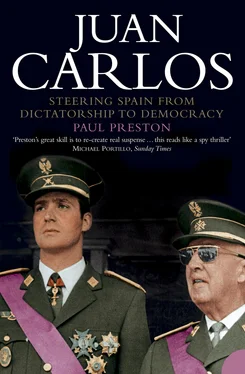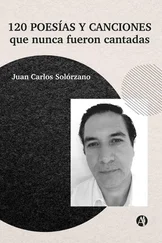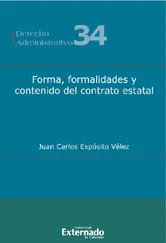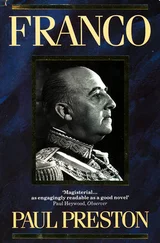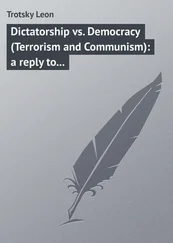While Juan Carlos and Don Juan were in the United States, López Rodó was continuing to beaver away at his plan for the post-Franco monarchy. The first fruit of his work as head of Carrero Blanco’s secretariat of the Presidencia was the Ley de Principios del Movimiento (Declaration of the Fundamental Principles of the Movimiento ). The text was presented to the Cortes by Franco himself on 17 May 1958. It was clear that López Rodó had worked on the gradual reform to which he had referred in his conversations with Ruiseñada and Don Juan. The twelve principles were an innocuously vague and high-minded statement of the regime’s Catholicism and commitment to social justice, but within them could be discerned the formal decoupling of the regime from Falangism. The seventh principle stated that: ‘The political form of the Spanish State, within the immutable principles of the Movimiento Nacional and the Ley de Sucesión and the other fundamental laws, is the traditional, Catholic, social and representative monarchy.’ 81 The biggest obstacle to Don Juan, or his son, ever accepting the idea of a monarchy tied to the regime was the Falange. Now it was shifting slightly. Of the Movimiento Nacional understood as being the Falange Española Tradicionalista y de las JONS , central to schemes such as that of Arrese, there was nothing in Franco’s speech.
The text made it appear as if Franco was edging towards the idea of a monarchical restoration, and many monarchists eagerly interpreted the speech in those terms. So soon after Arrese’s aborted plans, this constituted a puzzling u-turn that can be explained largely in terms of López Rodó’s influence. Franco had left the drafting of his speech to Carrero Blanco and he in turn had left it to López Rodó. Either because he had not fully digested its implications, or else because they simply did not bother him, he had not discussed the text in cabinet before making the speech. In the Cortes, several ministers had revealed their dismay at its apparent departure from Falangism by ostentatiously failing to applaud. After a lengthy conversation with Franco in the wake of the speech, Pacón reached the conclusion that none of this mattered, since it was clear that Franco had no intention of leaving power before death or incapacity obliged him to do so. Pacón asked him if he excluded Don Juan as a possible successor in such a case. Franco replied: ‘The designation of a King is the task of the Consejo del Reino but I certainly don’t exclude him. If Don Juan accepts the principles of the Movimiento unreservedly, there is no legal reason to exclude him.’ That Pacón had got it right was revealed on 6 June 1958, when Franco made Agustín Muñoz Grandes Chief of the General Staff replacing Juan Vigón. Muñoz Grandes was to ensure that the Caudillo’s wishes would be carried out if he died or were incapacitated. The appointment made it unequivocally clear that Franco had no intention of handing over to any successor before that time. 82
The promulgation of the Ley de Principios del Movimiento had taken place while Juan Carlos and his father were in New York. After their visit was over, Don Juan made the hazardous trip back across the Atlantic in the Saltillo. On reaching the Portuguese port of Cascáis on 24 June, several dozen enthusiastic Spanish monarchists were waiting to congratulate him on his remarkable maritime exploits. On the quayside, Franco’s new Ambassador to Portugal, José Ibáñez Martín, was jostled. When a Portuguese journalist asked the name of the man who had replaced Nicolás Franco in the Lisbon Embassy, several voices replied in unison ‘ sinvergüenza’ (scoundrel). As Don Juan posed for photographers, the Ambassador tried to insinuate himself into the frame. Ibáñez Martín was seized and dragged to one side by an ardent young monarchist who had to be restrained from throwing him into the water. When Ibáñez Martín protested to Don Juan, he was ignored. At the reception held afterwards, there was booing when someone announced that a delegation of Procuradores from the Cortes planned to ask Don Juan to accept the Ley de Principios del Movimiento. In his speech, Don Juan declared: ‘I won’t return as Franco’s puppet. I will be King of all Spaniards.’ He told the dissident General Heli Rolando de Telia that only prudence prevented him making a full public break with Franco. Full reports on the various incidents soon reached the Caudillo. 83
Even without these declarations, the Caudillo now had yet another reason for resenting Don Juan. Franco always claimed that his real vocation was in the Navy. Only ten years earlier, on 12 October 1948, at the monastery of La Rábida where Christopher Columbus kept vigil on the night before setting out from Palos de Moguer on his historic voyage, Franco had awarded himself the title of Gran Almirante de Castilla (Lord High Admiral of Castile). Considering himself to be the twentieth-century Christopher Columbus, he must have been deeply irritated by the adulation showered on Don Juan for his real maritime achievements. 84 Franco was even more displeased when a report from the security services about Don Juan reached him. It consisted of a transcription of a lengthy conversation with a German journalist. Don Juan denounced the illegitimacy of Franco’s tenure of power and stated categorically that the next King had to be committed to national reconciliation. 85
It was hardly surprising that the Caudillo’s determination not to hand over the baton for a very long time was reiterated in his end-of-the-year broadcast on New Year’s Eve 1958. Despite the fact that the Spanish economy was on the verge of collapse, with inflation soaring and working-class unrest on the increase, he dedicated the bulk of his lengthy speech (30 pages in its printed version) to a hymn of praise to the Movimiento. In particular, he presented it as the institutionalization of his victory in the Civil War. The underlying message of his obscure ramblings was that the future succession would take place only in accordance with the principles of the Movimiento. Denouncing the failures of the Borbón monarchy in terms of ‘frivolity, lack of foresight, neglect, clumsiness and blindness’, he claimed that anyone who did not recognize the legitimacy of his regime was suffering from ‘personal egoism and mental debility’. After these unmistakable allusions to his person, Don Juan could hardly feel secure about his position in the Caudillo’s plans for the future. 86
Franco’s words made it clear that he was keen to dampen the ardour of those monarchists who had taken the Ley de Principios del Movimiento as implying that a handover of power to Don Juan was imminent. Their optimism was exposed at a monarchist gathering in Madrid on 29 January 1959. Progressive supporters of Don Juan held a dinner at the Hotel Menfis to launch an association known as Unión Española. The days of aristocratic courtiers like Danvila or Ruiseñada were now giving way to something altogether more modern. Unión Española was the brainchild of the liberal monarchist lawyer and industrialist, Joaquín Satrústegui. Although Gil Robles was present, he did not make a speech. Those who did – including the Socialist intellectual from the University of Salamanca, Professor Enrique Tierno Galván – made it clear that the monarchy, to survive, could not be installed by a dictator but had to be re-established with the popular support of a majority of Spaniards. The hawk-like Satrústegui directly contradicted Franco’s end-of-year declaration that the Crusade was the fount of the regime’s legitimacy.
To the outrage of the Caudillo, Satrústegui, who had fought on the Nationalist side in 1936, argued that the tragedy of a civil war could not be the basis for the future. He specifically confronted Franco’s oft-repeated demand that Don Juan swear loyalty to the ideals of the uprising of 18 July 1936, saying ‘a civil war is something horrible in which compatriots kill one another … the monarchy cannot rest on such a basis.’ He brushed aside the idea of an ‘installed’ monarchy enshrined in the Ley de Sucesión , declaring openly that ‘Today, the legitimate King of Spain is Don Juan de Borbón y Battenberg. He is so as the son of his father, the grandson of his grandfather and heir to an entire dynasty. These, and no others, are his titles to the throne.’ Franco was livid when he read the texts of the Hotel Menfis after-dinner speeches and fined Satrústegui the not inconsiderable sum of 50,000 pesetas. That the penalties were not more severe, comparable for instance to those meted out to left-wing opponents, derived from the fact that Franco did not want to be seen to be persecuting the followers of Don Juan. 87 Given that victory in the Civil War, as he repeatedly stated, was the basis of his own ‘legitimacy’, Franco could not help but be appalled by what had been said and by the fact that Don Juan refused to disown Satrústegui. He told his cousin Pacón that the monarchy of either Don Juan or Juan Carlos, if not based on the principles of the Movimiento , would be the first step to a Communist takeover. 88
Читать дальше
